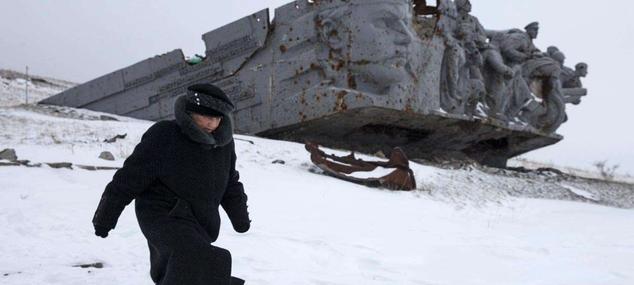Story Highlights
- Only 4% support Crimea's joining Russia
- Few approve of allowing Donetsk, Luhansk to leave Ukraine
- Forty-three percent approve of decentralizing power
This article is the third in a weeklong series focusing on the most recent public opinion research data available from Ukraine.
WASHINGTON, D.C. -- Ukrainians emphatically do not approve of Crimea's joining Russia earlier this year; only 4% support it. But at the same time, they are not in any rush to reclaim the region: Just 16% say Ukraine should try to regain it immediately, while 40% say it should wait until the situation in the southeastern region stabilizes, and almost as many (34%) say Ukraine should not try to regain Crimea.
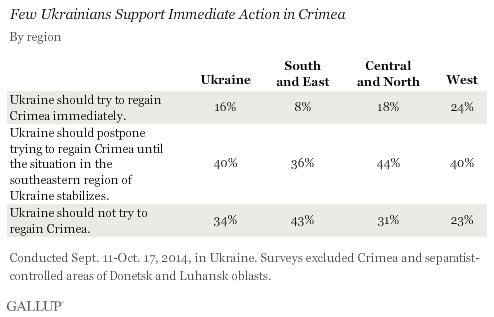
Gallup's interviews in Ukraine this year took place in September and October, after a cease-fire between the Ukrainian government and pro-Russian separatists in the country's East. Gallup's polls in 2014 excluded the Crimea region, which is currently considered occupied territory, and some areas of the Donetsk and Luhansk regions where security was an issue. The excluded areas account for approximately 10% to 13% of Ukraine's adult population.
While Crimea's decision to join Russia is unpopular in all parts of the country, there are big differences in what people think the next steps should be, depending on where they live. Ukrainians living closest to Crimea, in the Russian-leaning South and East, are most likely to believe Ukraine should not try to regain the territory (43%), and only 8% think it should be regained immediately. Residents in the West and in the Central and North, on the other hand, are more in favor of immediate action, but they are more likely to favor waiting than any other option.
Regaining Stability After Crimea
Russia's annexation of Crimea in March opened the door for Russian-backed separatists in the Donetsk and Luhansk regions to rebel and throw Ukraine into turmoil. After having lost Crimea, Ukrainians uniformly loathe the idea of losing yet more territory in the eastern regions of Donetsk and Luhansk to stabilize their country. Only 7% of Ukrainians would approve of allowing these two areas to leave Ukraine, while 84% would not approve. Support is only minimally higher in the South and East, where 11% would approve of allowing Donetsk and Luhansk to leave.
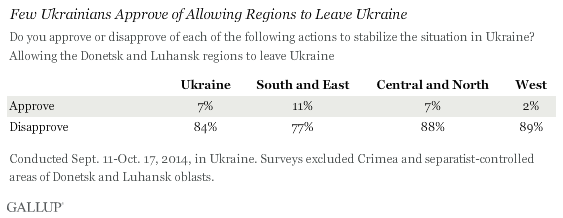
Ukrainians are more comfortable, however, with the idea of taking power from the national government and giving broad powers to the regions and local authorities if it would bring stability. Still, they are mixed on whether this is the right path: 43% would approve of this course, while 35% would not approve.
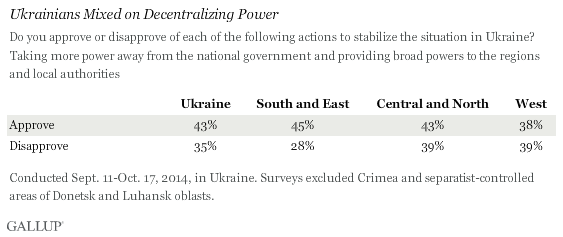
The most popular option among Ukrainians for stabilizing their country was holding early parliamentary elections -- which is actually what took place on Oct. 26, a week after the Gallup survey concluded. Ahead of the snap elections, a majority of Ukrainians (54%) said they approve of holding these early elections, with strong support coming from residents in the West (68%) and the Central and North (61%). Support was much more muted in the South and East (39%).
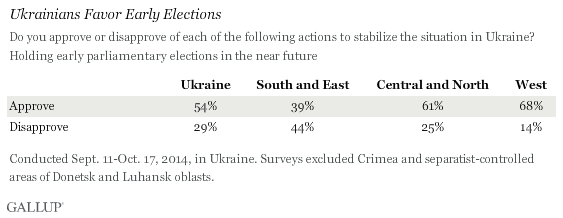
Implications
With the exception of the situation with Crimea, many of the things that Ukrainians believe needed to happen in their country to regain stability are happening. The fresh truce between Ukrainian government forces and Russian-backed separatists appears to be holding, and the situation in the country's southeastern region is more stable than it has been in months. Donetsk and Luhansk now appear less likely to follow the same path as Crimea. Further, early elections in October ushered in a new parliament that hailed unity, which would have been less conceivable earlier this year, but will be much needed in the days ahead in this still clearly divided country.
Survey Methods
Results are based on face-to-face interviews with 1,000 adults, aged 15 and older, conducted in Sept. 11-Oct. 17, 2014, in Ukraine. For results based on the total sample of national adults, the margin of sampling error is ±3.8 percentage points at the 95% confidence level. All reported margins of sampling error include computed design effects for weighting.
Gallup's polls in Ukraine in 2014 excluded the Crimea region, which is currently considered occupied territory, and some areas of the Donetsk and Luhansk oblasts where security was an issue. The excluded areas account for approximately 10% to 13% of Ukraine's adult population.
For more complete methodology and specific survey dates, please review Gallup's Country Data Set details. Learn more about how the Gallup World Poll works.
